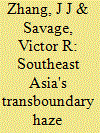|
|
|
Sort Order |
|
|
|
Items / Page
|
|
|
|
|
|
|
| Srl | Item |
| 1 |
ID:
170224


|
|
|
|
|
| Summary/Abstract |
The Indian Ocean contains one of the busiest trade routes in history, connecting East Asia, Southeast Asia, South Asia, the Middle East, and East Africa, as well as giving passage to Europe. Given its historical and economic connections and diffusion of ideas, religions, and cultural traditions, the Indian Ocean region's (IOR) fertile cultural complex can serve as an important platform for addressing climate change. In order to survive and thrive under climate change, societies in the IOR need to undergo profound transformation or metamorphosis. We briefly discuss the history and major climate change issues of the IOR before proposing five suggestions: engaging in regional cooperation on climate change; combining the region's folk science and indigenous traditions with modern science and technology in the formulation and implementation of climate strategies; embracing the region's terraqueous geography; initiating development corridors inland; and ensuring that cities and urban development are sustainable and liveable.
|
|
|
|
|
|
|
|
|
|
|
|
|
|
|
|
| 2 |
ID:
173816


|
|
|
|
|
| Summary/Abstract |
The Indian Ocean contains one of the busiest trade routes in history, connecting East Asia, Southeast Asia, South Asia, the Middle East, and East Africa, as well as giving passage to Europe. Given its historical and economic connections and diffusion of ideas, religions, and cultural traditions, the Indian Ocean region's (IOR) fertile cultural complex can serve as an important platform for addressing climate change. In order to survive and thrive under climate change, societies in the IOR need to undergo profound transformation or metamorphosis. We briefly discuss the history and major climate change issues of the IOR before proposing five suggestions: engaging in regional cooperation on climate change; combining the region's folk science and indigenous traditions with modern science and technology in the formulation and implementation of climate strategies; embracing the region's terraqueous geography; initiating development corridors inland; and ensuring that cities and urban development are sustainable and liveable.
|
|
|
|
|
|
|
|
|
|
|
|
|
|
|
|
| 3 |
ID:
064391


|
|
|
|
|
| Publication |
London, Marshall Cavendish Academic, 2005.
|
| Description |
xiv, 489p.pbk
|
| Standard Number |
9812103066
|
|
|
|
|
|
|
|
|
|
|
|
Copies: C:1/I:0,R:0,Q:0
Circulation
| Accession# | Call# | Current Location | Status | Policy | Location |
| 049872 | 959.054/SAV 049872 | Main | On Shelf | General | |
|
|
|
|
| 4 |
ID:
169143


|
|
|
|
|
| Summary/Abstract |
This paper examines the political intricacies inherent in the management of Southeast Asia's transboundary haze pollution. It argues for a scalar perspective in understanding the complexities of the haze problem. The so‐called ‘inconvenient truth’ is unravelled by teasing out some issues in the national and regional political ecologies, and the challenges of synchronising co‐operation at the national, regional and global scales. Discussion shows that the ‘environment’ takes on different meanings at each scale, and both Indonesia and the Association of Southeast Asian Nations (ASEAN) need to recognise this in order to engage more effectively with the transboundary environmental issue. Specifically, inadequate management of forest resources in Indonesia, ASEAN's principle of ‘non‐interference’ and a lack of a holistic ecosystem perspective are amongst some of the interconnected issues addressed. The paper calls for a greater awareness of structural weaknesses in the management of forest resources and a change in ASEAN's environmental paradigm to a more holistic ecosystem perspective that prioritises not just environmental and human health, but also a healthy and sustainable ecosystem.
|
|
|
|
|
|
|
|
|
|
|
|
|
|
|
|
|
|
|
|
|